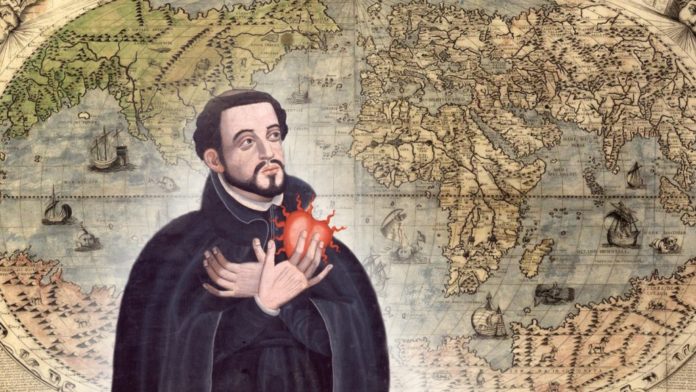St. Francis Xavier, one of St. Ignatius Loyola’s closest friends and an original founding companion of the Society of Jesus. The saint is the most honored one by the Catholic Church, other Christian churches, and the Jesuit order for his missionary accomplishments particularly in India, Southeast Asia, and Japan.
He was born in 1506 in the family castle in the Basque region of northern Spain. He was the fifth and youngest child of noble, wealthy, and pious parents.
At the age of nineteen years, and after completing the preliminary course of studies, he left home permanently, bound for the University of Paris. By thirty years of age, he had earned a Master of Arts degree in philosophy, taught the subject for four years, and then studied theology for two years.
While studying at the University, Ignatius Loyola, who was a fellow student, became an increasingly important influence on Xavier. So much so that, despite early reluctance, Xavier eventually made the Spiritual Exercises under his direction. In August of 1534, he joined Ignatius and five other companions in pronouncing vows. Together, Xavier and Ignatius have ordained priests in 1537. In the following year, Xavier went to Rome to share in the discussions that led to the formal founding of the Society of Jesus. Upon approval, Xavier served as the secretary of the Society until leaving for India in 1541.
He led an extensive mission into Asia, mainly in the Portuguese Empire of the time, and was influential in evangelization work, most notably in India. Although some sources claim that the Goa Inquisition was proposed by Francis Xavier, his letter to the king of Portugal, John III, asked for a special minister whose sole office would be to further Christianity in Goa. He also was the first Christian missionary to venture into Japan, Borneo, the Maluku Islands, and other areas. In those areas, struggling to learn the local languages and in the face of opposition, he had less success than he had enjoyed in India. Xavier was about to extend his missionary preaching to China when he died on Shangchuan Island.
He was beatified by Pope Paul V on 25 October 1619 and canonized by Pope Gregory XV on 12 March 1622. In 1624, he was made co-patron of Navarre. Known as the “Apostle of the Indies” and “Apostle of Japan”, he is considered to be one of the greatest missionaries since Paul the Apostle. In 1927, Pope Pius XI published the decree “Apostolicorum in Missionibus” naming Francis Xavier, along with Thérèse of Lisieux, co-patron of all foreign missions. He is now co-patron saint of Navarre, with Fermin. The Day of Navarre in Navarre, Spain, marks the anniversary of Francis Xavier’s death, on 3 December 1552.



